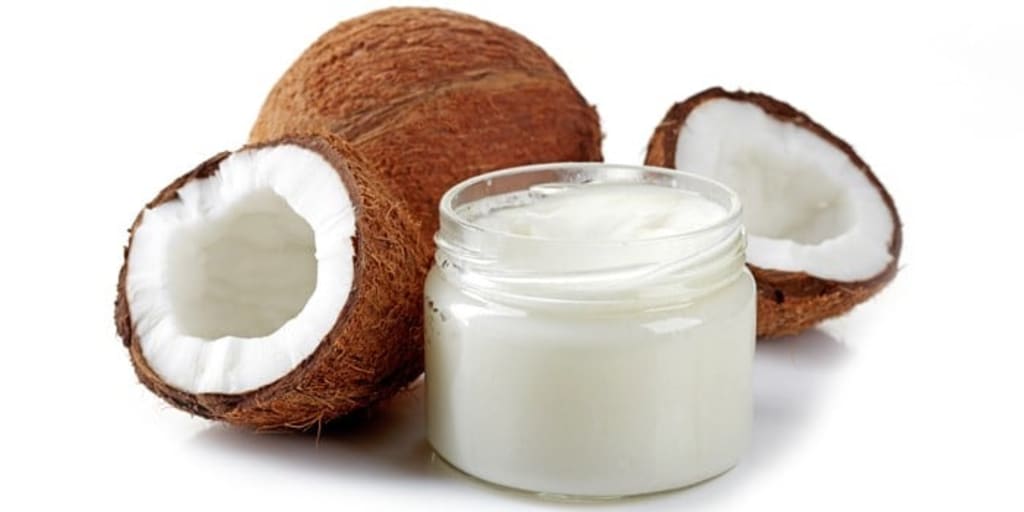Coconut oil, helps to lose weight and fight many diseases (all you need to know)
healthiest way to be fit

Coconut oil is considered a super food, particularly nutritious, which has many uses, from food preparation to its use as a basic ingredient in dermatological cosmetics , for hair and skin care.
In addition, coconut oil is a staple of raw vegan diets and has many health benefits.
Why is coconut oil beneficial and what is its nutritional composition
Coconut oil is the only vegetable oil that has the highest concentration of fatty acids, namely 90%, which, contrary to what we might think, are good for health. This is due to the content of lauric, caprylic and capric acid which are quickly assimilated in the body and are transformed into energy. Therefore, coconut oil is recommended for people who want to lose weight and those who exercise regularly.
At the same time, studies have shown that these fats have therapeutic effects on the body, raise the level of "good" cholesterol in the body and protect against cardiovascular disease. In addition, coconut oil contains 10% fewer calories than other vegetable fats.
Another benefit of coconut oil is the stimulation of the immune system due to natural antioxidants. It also contains vitamins A, C, D, iron and calcium, which help regulate digestion and metabolism. Compared to 100 grams of coconut oil, coconut oil has 862 calories.
How to choose the healthiest coconut oil correctly
As with other oils, it is of several kinds: virgin, extra virgin, hot or cold pressed, refined or unrefined. Here are the characteristics of each type and which is the best of them:
chemically refined oil - it is obtained by a distillation process with the help of chemicals, at high temperatures
virgin or extra virgin olive oil - is cold pressed or extracted, through a mechanical process of pressing raw, fresh or dried coconut pulp, being the healthiest
unrefined coconut oil - especially the cold-extracted, organic one is the most beneficial of all, because it keeps all its properties unchanged
At the same time, a high quality oil solidifies and has a uniform composition, unlike the one with a lower quality, which has a non-uniform consistency and seems to be composed of small uneven pieces.
What are the benefits of coconut oil for the body
Coconut oil has many proven benefits for the health of the body. These includ e:
Protects the heart (cardiovascular protection) - due to the high level of lauric acid, coconut oil stimulates the production of HDL cholesterol (known as "good" cholesterol) in the body. This type of beneficial cholesterol reaches the liver, where it is broken down, does not affect blood vessels and therefore reduces the risk of heart disease, according to WebMD specialists. It is recommended to consume ½ - 1 teaspoon of coconut oil per day;
Regulates metabolism - coconut oil contains medium-chain triglycerides that can increase the burning of fat deposits in the body, because the medium chains break down more easily, while helping to increase energy levels;
Protects the internal organs - due to medium chain triglycerides, lauric acid and fatty acids, coconut oil protects the liver against diseases. These substances are easily converted into energy once they reach the liver and prevent the accumulation of fat in the body;
Stimulates the immune system - contains antimicrobial lipids, lauric, capric and caprylic acid that have antifungal, antibacterial and antiviral properties. The human body converts lauric acid into monolaurin, which has been scientifically proven to deal effectively with viruses and bacteria, while helping to detoxify the body, as evidenced by studies at the National Library of Medicine;
Improves digestion - coconut oil helps improve the functioning of the digestive system and prevents problems with the stomach or digestive tract, such as irritable bowel syndrome. Saturated acids have antimicrobial properties that help treat infections with various bacteria, fungi or parasites that can cause indigestion, according to a study by the Gastroparesis and Dysmotilities Association of Canada;
Helps maintain bone density - calcium is an important component of bones and teeth, and coconut oil facilitates the absorption of calcium in the body, helping to strengthen teeth and maintain bone strength. At the same time, it stops the appearance of caries, prevents the formation of tartar, but also osteoporosis, according to the study of the National Library of Medicine;
Has an anti-aging effect - due to the rich content of antioxidants, vitamins A and E, coconut oil has anti-aging properties, reducing the harmful effects of free radicals that age the skin. In addition, ferulic acid helps fade fine wrinkles, provides radiance and freshness to the skin and helps maintain healthy skin for longer. During the summer, coconut oil can be applied to the skin after sun exposure to reduce burns and soothe irritated skin;
Maintain thyroid health - thyroid disorders can cause hair loss, skin dehydration, fatigue, increased sensitivity to cold, weight gain or depression. Due to fatty acids, coconut oil helps the proper functioning of the thyroid gland and supports thyroid function which has the role of processing vitamins and minerals, hormone production and good development in children;
Fight with candida - this infection is caused by a high number of bacteria, called Candida albicans, which are found in the intestines and oral cavity. Coconut oil soothes inflammation caused by candida, and due to its high ability to retain moisture, prevents flaking of the skin;
Protects the skin - medium-chain triglycerides in coconut oil have antifungal properties that fight various skin fungi, 30% more than other mineral oils, according to WebMD specialists. It is important to continue treatment until all symptoms disappear. In addition, coconut oil contributes to the destruction of microbes due to lauric acid which has an antimicrobial role;
Regulates blood sugar levels - due to lauric acid, coconut oil in the diet regulates blood sugar levels and contributes to better glucose tolerance;
Soothes sore throats - to treat an irritated throat, you can gargle with a mixture of a tablespoon of coconut oil and warm water with lemon. The fatty acids in coconut oil have a disinfectant effect due to their antimicrobial properties;
Soothes diaper rash - coconut oil is a good natural, anti-inflammatory and antibacterial remedy that soothes baby's buttock erythema. It soothes pain, redness and itching;
Beneficial for breastfeeding - in the case of mothers who breastfeed and consume 3-4 tablespoons of coconut oil, along with vitamin D, increases the amount of milk, but also its nutritional intake, according to a study published by the National Library of Medicine. The result is the healthy development of babies, especially those who are underweight at birth;
Protects the gums - you can massage the gums with your finger using a little coconut oil, and optionally you can mix it with a little oregano oil. It will help you keep your gums healthy and strong;
Increases the ability to concentrate - a daily consumption of coconut oil helps to improve memory and increases the ability to concentrate, due to the medium chain fatty acids in its composition, beneficial for the brain. In addition, experts believe that coconut oil can even help treat Alzheimer's disease.
How to use coconut oil in the kitchen
Coconut oil can be used for cooking without problems, because it is resistant to high temperatures, and its composition remains unchanged. It does not oxidize easily, it does not produce the harmful effects that other cooking oils have, the burning point being at 180 degrees. Here's how to use coconut oil in the kitchen:
can replace butter and oil normally used in cooking;
you can add it to salads, tea or milk for a special flavor. If you want the drink not to be oily, but creamy, mix with a teaspoon as best you can;
you can eat it simply, on a slice of bread greased with coconut oil and a little honey;
can replace synthetic energizers, and 1-2 teaspoons a day are enough to benefit from all the necessary nutrients;
you can add it to protein smoothies or shakes and increase the absorption of vitamins, proteins and nutrients;
you can use it to prepare nutritious bars
can be used by those who follow a vegan or paleo diet, because it offers a special aroma, and once the temperature drops below 25 degrees, it solidifies and keeps the coagulated ingredients;
prepare your own peanut butter and mix in the food processor 2 teaspoons of coconut oil and two cups of walnuts (cashews, almonds, pecans). For more flavor you can add a little cinnamon or honey;
prepare a natural chocolate sauce with coconut oil, honey and cocoa powder in equal amounts, which you can use for healthy snacks;
a teaspoon of coconut before meals helps reduce hunger. Consumption of coconut oil activates the production of ketones in the body, which helps metabolize fats and release energy;
healthy caramels for children - combine coconut oil with coconut cream and other spices such as cinnamon, cardamom or vanilla and even a little agave syrup. You will get a sweet and healthy snack for children. You can keep them cold.
How to use coconut oil as a cosmetic product
Coconut oil has many benefits for skin and hair, being an ingredient used in cosmetics:
For skin - the fatty acids in coconut oil help to fix collagen fibers, an essential element for skin firmness, and help to quickly heal the epidermis. You can apply coconut oil directly on the face, massaging lightly until it is completely absorbed into the skin, the result being a brighter and rejuvenated complexion. Also, if you apply a face mask made of coconut oil and spirulina, at least once a week, you will benefit from the nourishing qualities that rejuvenate the skin;
Hair mask - the fatty acids in coconut oil give hair shine, a healthier look and prevent split ends. You can apply a small amount to the tips to reduce their breakage. If you choose to apply a mask, you must wash your hair well, and after you dry it, massage it well with coconut oil, then wrap it in a towel and leave it on overnight;
Body lotion - you can use coconut oil instead of the usual body lotion. Helps moisturize the skin and restore the epidermis. You can apply it after showering, directly on damp skin, in a thin layer. It will be quickly absorbed into the skin, in a maximum of 2 minutes, without leaving your skin oily;
Lip balm - if you want to moisturize your lips, you can prepare your own natural lip balm from a mixture of coconut oil, shea butter and beeswax, a teaspoon of each ingredient. Then melt them in a glass bowl, through the bain-marie process, ie in the steam bath. Then pour the liquid into a commercial lip balm container, which you can find commercially, and keep the lip balm cool so that it does not soften;
Natural cleanser - applied topically, in the eye area, coconut oil reduces the signs of fatigue. In addition, it can be used as a cleanser. Mix 2 tablespoons of coconut oil, 1 tablespoon of vitamin E and 2 drops of lavender essential oil and refrigerate the mixture until it hardens. You can then use it to remove eye make-up, even to remove water-resistant mascara;
Detoxifying bath - you can take a detoxifying bath once a week with coconut oil and bath salt, this being an ideal method for relaxation and detoxification;
Prevents stretch marks - if you apply it daily on the skin, coconut oil can act as a good natural remedy that prevents stretch marks. It can also be used to heal wounds;
Treats cellulite - you can try a solution consisting of a tablespoon of coconut oil and 10 drops of grapefruit essential oil to fight cellulite. Vigorously massage the affected area with circular movements, repeating this treatment after each bath;
Shaving solution - coconut oil can also be used by men when shaving, being better than shaving gel or foam. In addition, it moisturizes and restores the skin after shaving and prevents irritation;
Anti-acne treatment - it acts as a natural antibiotic that fights bacteria that cause inflammation in the skin. For a quick effect, you can combine coconut oil with Tea Tree essential oil;
Skin scrub - if you mix coconut oil with coffee grounds and a little cinnamon, you will get a natural scrub for skin care;
Repairs cracked soles - coconut oil can be used as an alternative to classic creams and helps repair cracked heels and softens the skin;
Natural deodorant - you can prepare your own natural deodorant at home and you need 6-8 tablespoons of coconut oil, ¼ cup of baking soda and ¼ cup of corn starch. Mix the ingredients, gradually adding the coconut oil until you get a mixture with a creamy consistency. Then put the mixture in a container and let it solidify. You can apply it on the skin with your fingers;
Natural toothpaste - mix coconut oil with baking soda and use this mix instead of regular toothpaste. Optionally, you can also add a little peppermint essential oil;
Speeds up the tanning process - if used as such, coconut oil helps get the perfect tan much faster than other cosmetics and at the same time protects the skin from sunburn'
Why and when to use coconut oil in moderation
When choosing coconut oil, you must keep in mind that the best is the cold pressed, not hydrogenated, because it retains its beneficial properties. However, coconut oil should be consumed in moderation by some people and has several contraindications:
Coconut oil should not be consumed in large quantities by people suffering from cardiovascular disease, diabetes or those suffering from obesity, due to the high content of fatty acids and high caloric intake. It is recommended to consume only 1-2 teaspoons per day
Coconut oil can also be consumed by pregnant or breastfeeding women, but it is recommended to be consumed in moderation, not excessively. The most suitable is cold pressed coconut oil, packed in glass containers
Coconut oil versus coconut butter - features and differences
Although we might think that coconut oil and coconut butter are similar, they are actually two different products that are used differently.
In terms of production, coconut oil is extracted from the core of coconut, by various processes (hot or cold pressing) depending on which retains its natural qualities and is healthier. Coconut butter is obtained from the entire contents of coconut, including pulp and coconut water, which is shredded and then turned into a paste with the consistency of a puree.
Unlike coconut oil, which contains only fatty acids and vitamins, coconut butter has all the fats, fibers and nutrients of coconut.
Coconut oil can be used in both liquid and solid state, for frying or for cooking food and cakes.
Coconut butter is less used in cooking, but can be consumed as such, instead of classic butter. It can also be combined with both sweet and savory foods.
Like coconut oil, coconut butter can be used to moisturize the skin. You can apply it in the evening, before bed, to let it work during the night.
In terms of health benefits, coconut butter, like oil, helps strengthen the immune system, balances blood sugar levels and helps eliminate excess weight.
About the Creator
Maria Ostasevici
Communication and public relations student, Moldova
Instagram profile: maria.ostasevici;
mother of two awesome Dobermans.
BEST VERSION OF YOURSELF- THAT'S TRULY EPIC






Comments
There are no comments for this story
Be the first to respond and start the conversation.